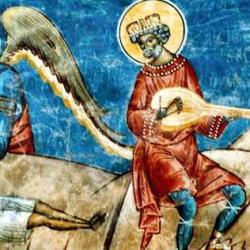Psalm 87 is a hymn to Zion. The name “Zion” occurs four times, and the Psalm declares Yahweh’s love for Zion (v. 1), the glory of Zion as city of God (v. 2), the joy that fills Zion (v. 6).
It could be a “nationalistic” hymn to Israel’s ancient capital, but it isn’t. While celebrating Zion as the holy mountain and dwelling of God, the Psalm also lists the nations other than Israel that know God: Egypt, Babylon, Philistia, Tyre, and Ethiopia (v. 3). According to the Old Testament, each of these have been influenced by or allied with Israel. During the time of Joseph, Pharaoh favored Jacob. In Daniel, Nebuchadnezzar’s Babylon supports the faithful exiles. Philistia was usually Israel’s enemy, but David spent time in Gath and allied with its king, Achish. Hiram of Tyre sent supplies and craftsmen to assist in building Solomon’s temple.
Psalm 87 goes further. These Gentile nations were not only allied with Zion but were born there. They are treated as home-born sons of Zion (vv. 3-5), and they are they ones who dance and sing of the divine Spring of Zion.
It’s a nice thought: Gentiles treated as if they were children of Zion. But mere poetry, isn’t it?
Perhaps not. Let’s project the Psalm into the new covenant, as a prophecy of the adoption of Gentiles into the family of Zion. We can say, at least, that nations—including some of those listed—were reborn as children of Zion. Egypt and Ethiopia, for example, were once largely Christian.
But we can tease this out further: Nations are not merely reborn in the new Zion that is the church. Many nations are born as nations in Zion. Many factors go into nation-making, but Christianity was a significant force. Christian missionaries gave some nations their language (Slavic alphabet from Cyril and Methodius, Wycliffe), and Christian faith contributed to the formation of national identity throughout Europe.
Born in Zion: Poetry, but not mere poetry.















